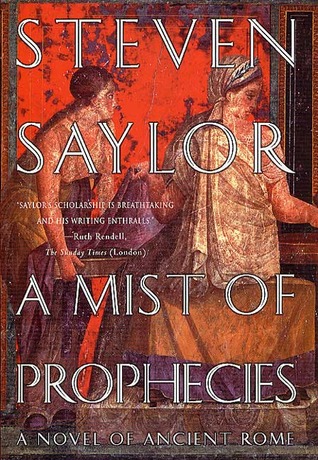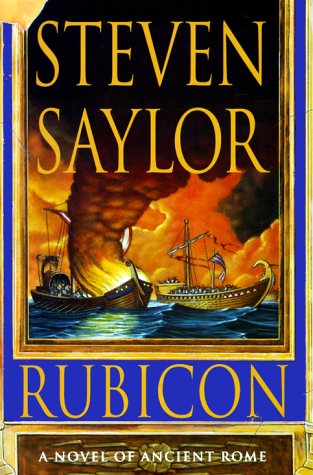I received this book for free from the library in exchange for an honest review. This does not affect my opinion of the book or the content of my review.
Source: the library
A Mist of Prophecies
by
Steven Saylor
It is part of the Roma Sub Rosa #8 series and is a historical mystery in Hardcover edition that was published by Minotaur Books on May 27, 2002 and has 288 pages.
Explore it on Goodreads or Amazon
Other books in this series include [books_series]
Other books by this author which I have reviewed include Arms of Nemesis, Seven Wonders, Catilina's Riddle, The Venus Throw, The House of the Vestals, A Murder on the Appian Way, Rubicon, Last Seen in Massilia
Eighth * in the Roma Sub Rosa ancient Roman historical mystery series and revolving around Gordianus the Finder and his family in the Rome of 48BC. If you’re interested, there is a chronological listing of the Roma Sub Rosa (and the Ancient World prequel) books on my website.
Chronologically, it’s MY eighth and Saylor’s ninth or twelfth if you include the Ancient World books. The reason it’s my eighth is because the technical sixth, The House of the Vestals, is a collection of short stories that I’ve slotted in chronologically.
My Take
I continue to love how real Saylor makes his stories. I feel as though I’m there in Rome, feeling the heat and tasting the food, interacting with real people. The research Saylor has done has that ring of authenticity as well; you can see how very much he’s done to bring life to A Mist of Prophecies.
That said, Saylor employed an odd sort of foreshadowing as he flips back and forth between the past and the present. It’s not particularly confusing, but it did throw me off. I don’t feel it was well done. For the rest, A Mist of Prophecies is more of a catch-up on what is happening in Rome as Gordianus makes the rounds of seven Roman matrons and interacts with Cassandra.
Hmmm, Diana is asserting her abilities to take up her father’s previous occupation as a Finder, and this papa is not happy. It could be interesting in future stories to see if she does start detecting.
Cytheris has the scoop on Cassandra’s true identity, and it’s so much more interesting than what Rome knows. And yes, there is a spattering of licentious behavior in a number of the characters’ backgrounds. I do love how well Saylor fleshes out the women, especially when there is so little, historically, to go on other than asides in the men’s biographies and letters.
The economy in Rome is suffering with all the strife between Caesar and Pompey. Prices are sky-high for everything, and it’s wiping out everyone from high to low, adding another level of conflict.
The Story
It’s a fluke that Cassandra dies in Gordianus’ arms, and as he mourns her loss, he organizes her funeral only to have seven surprise mourners. It’s those mourners who will provide the clues to her murderer.
Yet, it’s not Cassandra’s death that is riling up Rome, but Caelius with his diatribes against bankers and landlords. With so many of Rome’s citizens in debt and losing everything they own, his words are welcome and make Caelius a man to watch.
Meanwhile, Caesar’s actions trouble Gordianus: Romans were never meant to be ruled by a king.
The Characters
Gordianus the Finder retired a year before events in Rubicon, 6. Bethesda is his ill wife. Diana, his daughter, is married to Davus, a former slave who now serves as Gordianus’ bodyguard. Eco, his son, is married to Menenia, and they have twin daughters. Hieronymus the Massilian from Last Seen in Massilia, 7, is now living with Gordianus in Rome. Mopsus and Androcles are brothers and slaves in his household. Meto, Gordianus’ former son (see Last Seen in Massilia), is with Caesar again.
The epileptic Cassandra is named for the prophetess who saw the future but no one ever believed her. Rupa is her mute bodyguard.
Terentia is Cicero’s wife; he is in Greece with Pompey. Tullia is their daughter and married to Dolabella, her third marriage and a huge mistake. Dolabella is in charge of Caesar’s fleet in the Adriatic. Fabia is Terentia’s sister and a Vestal Virgin.
Antonia is the wife of Marc Antony, Caeser’s right-hand man who has been left in charge of Rome. And there’s no love lost between them! Cytheris is a mime actress and Antony’s mistress given to him by Volumnius, a rapacious banker who has loaned money to Gordianus. Chrysippus is one of Cytheris’ slaves.
Fulvia is a widow twice over. Her first husband was Clodius (A Murder on the Appian Way, 5) while the second was Gaius Curio whose head now adorns King Juba’s court. Sepronia is Fulvia’s singleminded mother. Thraso is one of Fulvia’s slaves.
Fausta is the very promiscuous daughter of the dictator Sulla; she’s technically married to the exiled gang leader, Titus Annius Milo (A Murder on the Appian Way and Last Seen in Massilia). Birria was one of Milo’s gladiators and is now Fausta’s bodyguard.
Calpurnia is Caeser’s wife, and she’s running Caesar’s spy network in Rome. Clodia was once the most notorious woman in Rome until events in The Venus Throw, 4.
Marcus Caelius (The Venus Throw) is back in town as one of Rome’s magistrates, but he’s speaking against Caesar these days.
Publius Servilius Isauricus is Caesar’s fellow consul. Gaius Trebonius is the city praetor (we first met him in Last Seen in Massilia) charged by Caesar to manage his economic plans.
Didius is an old friend of Gordianus’; his shop sells writing materials and specializes in copying documents.
The chin-waggers at the Forum
Volcatius, a Pompeian, is the most vocal; Canininus; and, the mild-mannered Manlius.
Pompey and Caesar are mentioned throughout but do not appear.
The Cover and Title
The cover is a blend of Roman fresco and a maid helping her mistress. It’s a mix as the bottom of the image is three dimensional with a purple-bordered orange cloth covering a bench on which a white-clad and be-turbanned woman sits with her back to us, one hand pulling on a purple cloth as her maid bends at the waist holding a shallow dish on which the cloth lies. The background is a damaged red panel bordered by black. The damage also appears on the women’s faces making them seem a part of the wall. It’s an odd effect.
The title refers to Cassandra and A Mist of Prophecies that she spreads throughout Rome.















